Yovo doko
Yovo doko is a delightful culinary treasure from Benin, known for its unique blend of flavors and textures. This traditional dish primarily features a base of fermented cornmeal, which is skillfully transformed into small, fluffy dumplings. The process of fermentation not only enhances the taste but also adds a nutritious element, making it a wholesome option. The dumplings are often served with a variety of rich and spicy sauces, showcasing the vibrant spices that characterize West African cuisine, such as chili peppers, garlic, and ginger. Each bite delivers a comforting warmth that is both satisfying and invigorating. Accompanying yovo doko, you might find a medley of vegetables and proteins, such as fish or meat, which further elevate the dish. These ingredients are usually stewed to perfection, allowing their flavors to meld beautifully with the dumplings. The dish is often garnished with fresh herbs, adding a burst of color and a hint of freshness that balances the savory elements. The combination of textures—from the soft, airy dumplings to the tender meats and crunchy vegetables—creates a delightful experience for the palate. Yovo doko is not only a meal but also a celebration of community and culture in Benin. It is often enjoyed during special occasions or family gatherings, bringing people together around a shared love for food. As you dive into this dish, you’ll not only savor its unique flavors but also appreciate the rich history and traditions behind it. Discovering yovo doko is like embarking on a flavorful journey through Benin, offering an authentic taste of West African heritage that is sure to leave a lasting impression.
How It Became This Dish
The History of Yovo Doko: A Culinary Gem from Benin #### Origins Yovo doko, a beloved dish from Benin, is a unique fusion of flavors and cultural influences that reflect the rich tapestry of West African cuisine. The term "yovo" refers to "white person" in Fon, one of the major languages spoken in Benin, while "doko" translates to "fritters." The dish is often associated with the local street food culture, where it is served as a snack or a light meal, particularly in urban areas where the hustle and bustle of life creates a demand for quick yet satisfying food. The origins of yovo doko can be traced back to the colonial period when Benin, like many West African countries, experienced significant European influence. The introduction of new ingredients and cooking techniques by Portuguese and French colonizers played a crucial role in shaping the culinary landscape of the region. The fritter itself is reminiscent of the European tradition of deep-frying, but the local adaptations led to the creation of a distinctly Beninese dish that marries indigenous flavors with foreign cooking methods. Yovo doko is typically made from a batter of flour, water, and yeast, which is then deep-fried until golden brown. However, the true magic of yovo doko lies in its fillings, which often include a mix of beans, vegetables, and spices. The dish varies from region to region, with some versions incorporating sweet elements like bananas or coconut, while others lean towards savory profiles, adding ingredients like onions, peppers, and herbs. #### Cultural Significance Yovo doko is more than just a snack; it is a cultural symbol that embodies the spirit of community and shared experiences in Benin. Traditionally sold by street vendors, yovo doko has become a staple in the daily lives of many Beninese people. It is often enjoyed on the go, making it a perfect food for the busy streets of Cotonou, the country's economic capital, where vendors set up their stalls in bustling markets, near schools, and outside of offices. The act of consuming yovo doko often brings people together. Whether it's a group of friends sharing a snack after school or a family enjoying it as a quick meal, yovo doko encourages social interactions. It is a dish that transcends age and class, appealing to young and old alike. In many ways, yovo doko represents the heart of Beninese hospitality—inviting, warm, and deeply rooted in local tradition. Moreover, yovo doko has also made its way into popular culture, celebrated in local festivals and gatherings. Its presence in festivities highlights its role as a comfort food that evokes nostalgia and a sense of belonging. In a rapidly changing world, yovo doko serves as a delicious reminder of Benin’s culinary heritage and the importance of preserving traditional foodways. #### Development Over Time As Benin has evolved politically and economically, so too has the preparation and presentation of yovo doko. In the pre-colonial and colonial eras, yovo doko was primarily a street food sold by women who were often the primary cooks and caretakers in their communities. The recipes were passed down through generations, with each family adding their unique twists to the dish, thus fostering a rich tradition of culinary creativity. With the advent of globalization and the rise of the food tourism industry in West Africa, yovo doko has gained recognition beyond its local roots. Chefs and food enthusiasts from around the world have begun to explore West African cuisine, shining a spotlight on dishes like yovo doko and elevating their status on the global culinary stage. This newfound attention has prompted some modern adaptations of the dish, blending traditional recipes with contemporary cooking techniques and ingredients. For instance, some chefs have experimented with the batter, incorporating gluten-free flours or alternative grains to cater to changing dietary preferences. Others have introduced innovative fillings, such as spicy fish or locally sourced vegetables, to appeal to a more diverse audience. These adaptations not only reflect the dynamic nature of food culture but also underscore the enduring appeal of yovo doko as a versatile dish that can accommodate new tastes while remaining true to its roots. Moreover, the rise of social media has played a significant role in popularizing yovo doko among younger generations. With platforms like Instagram and TikTok, food enthusiasts are sharing their experiences with yovo doko, showcasing its preparation, and celebrating its flavors. This digital exposure has not only fostered a renewed interest in traditional foods but has also encouraged young Beninese chefs to embrace their culinary heritage and innovate within it. #### Conclusion Yovo doko is a testament to the resilience and adaptability of Beninese cuisine. From its origins during the colonial period to its current status as a beloved street food, yovo doko embodies the rich cultural heritage of Benin. It serves as a bridge between the past and the present, connecting generations through shared culinary experiences. As the world continues to embrace diverse food cultures, yovo doko stands out not only as a delicious snack but also as a symbol of community and identity in Benin. In an age where global culinary trends often overshadow local traditions, yovo doko reminds us of the importance of preserving and celebrating our culinary heritage. Whether enjoyed on the bustling streets of Cotonou or in the comfort of home, yovo doko invites everyone to partake in the warmth of Beninese hospitality and the rich flavors of West African cuisine. As it continues to evolve and adapt, yovo doko will undoubtedly remain a cherished dish, a culinary gem that encapsulates the spirit of Benin.
You may like
Discover local flavors from Benin







